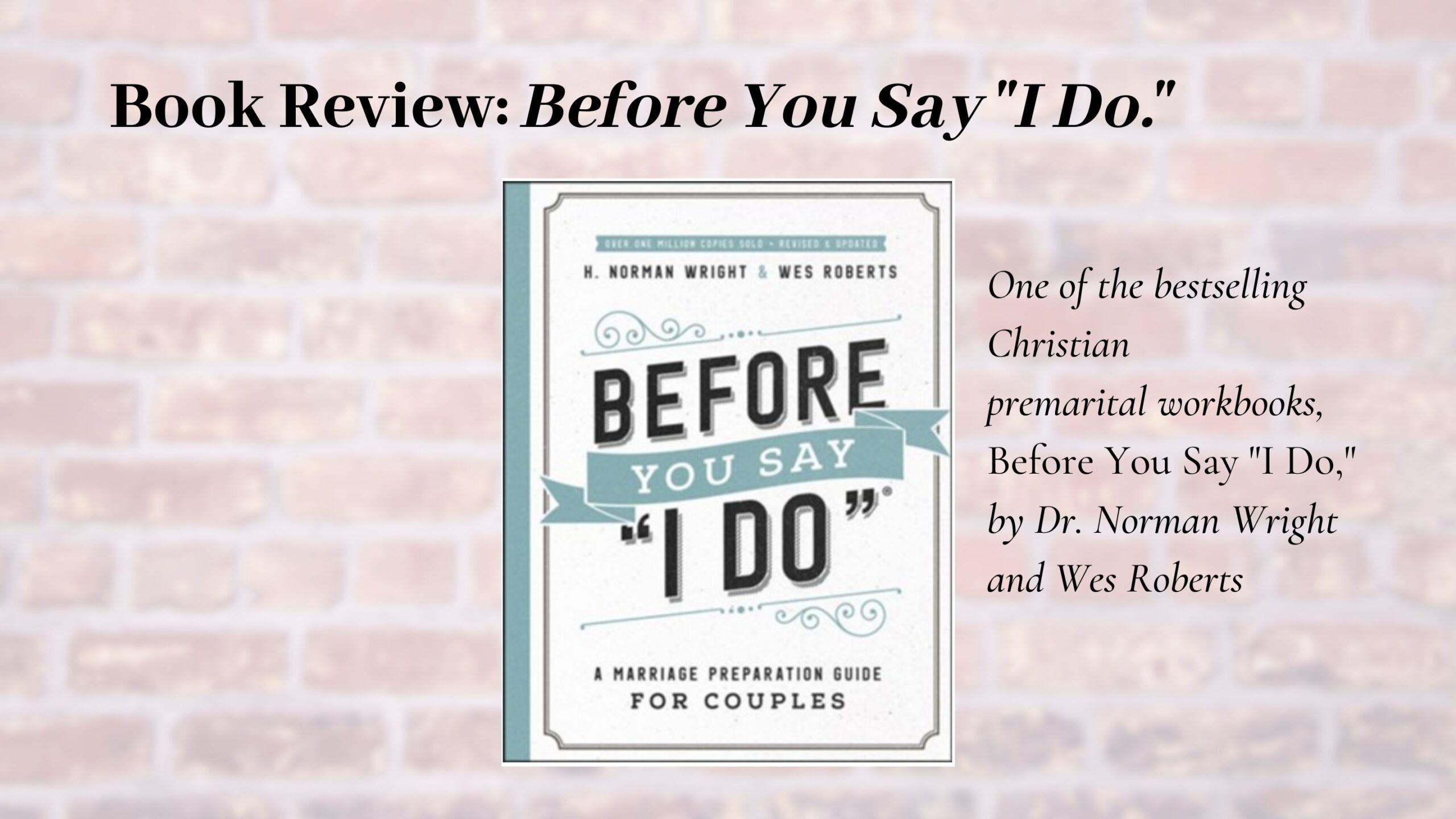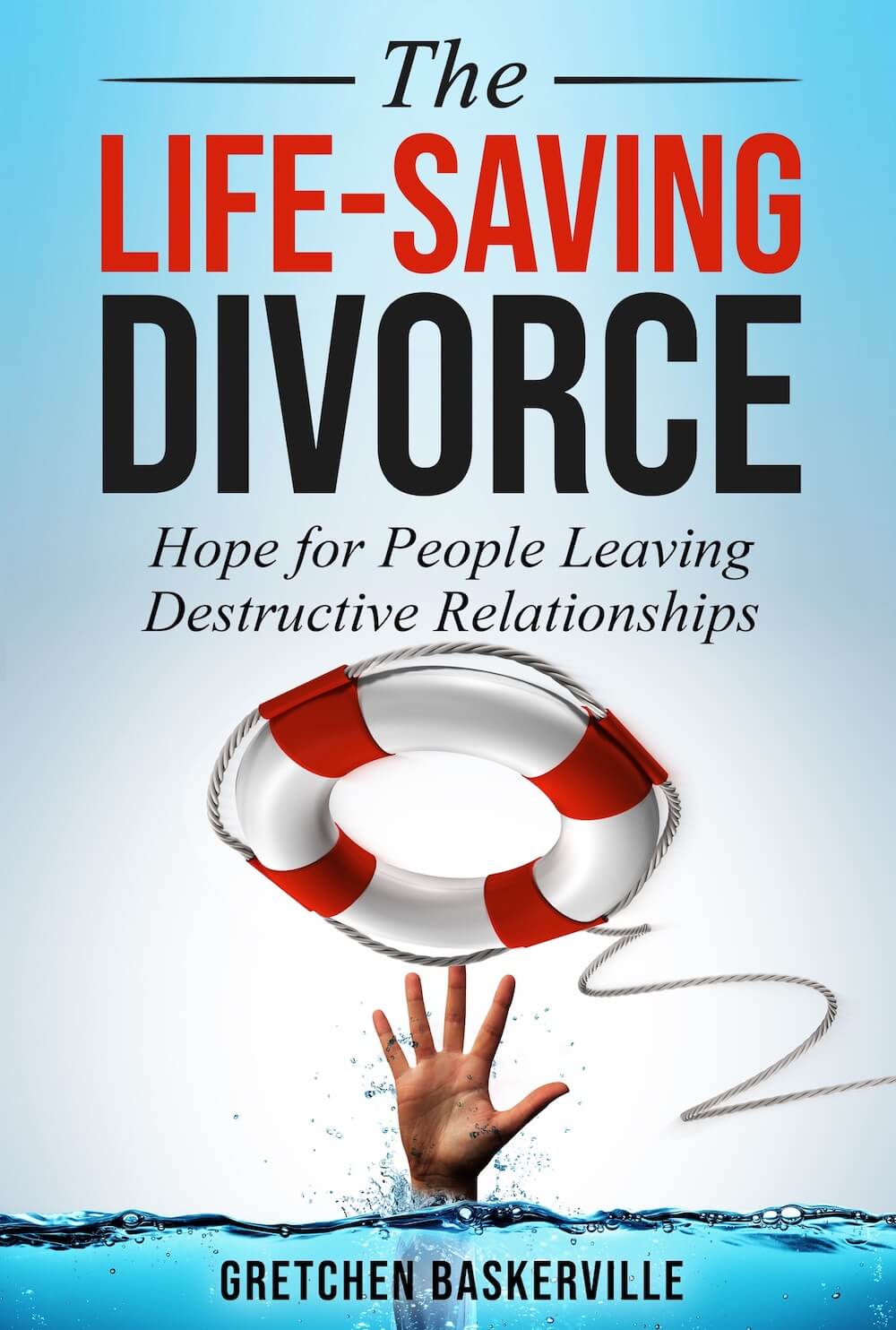Book Review: Before You Say “I Do,” by Norman Wright and Wes Roberts
I went through this Christian premarital workbook 35 years ago, before I married a man I met at my church.
But later I had to divorce. I didn’t want to divorce. I needed to divorce. It was a life-saving divorce. It was necessary, and the red flags were there before the wedding.
I’m not going to blame it on this book, but Before You Say “I Do” never brings up red flags, or addresses the topic of abuse, addictions, domestic violence, intimidation, sexual deviations, or any other serious problem.
About ten years after my divorce, I found a box in the garage. It had keepsakes from our wedding in the 1980s. And one of the items was this fill-in-the-blank workbook we used during our premarital counseling at church. I opened it.
I was curious to see how we had answered the questions and to find out what I had missed. How had I failed to see the danger? Surely there must be something that would explain how I could have married my ex-husband. After all, on the first page of this bestselling Christian premarital workbook, it said it was designed “to help you decrease the risk element in marriage.”
The workbook had a lot of good advice and Bible passages about God’s purpose in marriage, but the examples of marriage difficulties were minor, such as communication problems that almost any kind-hearted couple could solve by listening better, understanding each other’s views and expectations, and compromising a bit.
In the workbook, the word infidelity appeared only once, and the author said that such behavior “would be out of the question” in Christian marriage. No warning to avoid marrying someone who isn’t faithful ever was given, even though infidelity is the #1 reason for divorce in the U.S.
Infidelity is a serious problem in thousands of Christian marriages, about 1 in 7 Christian couples who attend church weekly, even where they pray, feel close to God, and report a transformation (such as becoming “born again” or having a turning point in their life due to their faith). Merely claiming to have a sincere faith doesn’t mean someone will be sexually faithful.
The word domination and the phrase unfair use of anger during conflict came up, but no warning bell was sounded, no advice was given. This wasn’t identified as a serious problem that might warrant cancelling your engagement or seeing a counselor.
An example of being overly controlling with money and questioning all the receipts was mentioned, but the comment was mild: “This is not how to start a marriage.” This is a serious issue. Shouldn’t the workbook have suggested the couple get some counseling or perhaps put off the wedding?
Why didn’t the author say more? Intimidation, domination, and control are serious red flags for domestic violence, but the book did not raise a warning. Shouldn’t a premarital book do this?
This book promotes marriage, not safe marriage.
The words adultery, lying, cheating, betrayal, gambling, pornography, and addiction didn’t appear in the premarital workbook at all. Nor did words such as abuse, slap, hit, push, or fight.
The only mention of substance abuse was an example of an alcoholic who one day stopped cold turkey and had a complete life change at the request of his spouse, along with the comment that that this change might happen in your marriage!
The opposite and far more likely scenario-where a spouse gets arrested for drunk driving, functions poorly, has mood swings, may be violent, loses jobs, or spends the vital family resources on drinking-was never addressed.
The workbook never brought up risky behaviors: abuse, adultery, prostitution, chronic lying, drug addiction, gambling, battering, child sexual abuse, or other behaviors that would destroy the trust in a marriage and jeopardize its future. There was no instruction to break your engagement or even to get counseling. It was as if these marriage-endangering problems didn’t exist in anyone you might meet at church. And when “undesirable behaviors” did crop up, the readers were told they could “learn to adjust.”
At one point the workbook said, “The best way to help another to change is to make changes in your own life,” but it never gave any suggestions of how you might do that. It never mentioned that one option might be to stop “adjusting” and “compromising,” and to draw a line in the sand. It didn’t say anything about requiring better behavior and possibly cancelling the wedding.
I had married a man in my church’s singles group who wasn’t trustworthy: someone with a sexual addiction.
Finally, as I read through our answers in the workbook, I realized:
I was shocked and closed the workbook. By the way, I bought the latest edition of H. Norm Wright and Wes Roberts’s book Before You Say “I Do,” just to see what the authors had changed, but didn’t find much. Every word and illustration I mentioned above exists (or does not exist) in today’s Kindle version of the book.
Before You Say “I Do” was full of premarital topics, but it did not address the red flags, outline the risk and likelihood of dangerous marriages, or recommend ending an engagement in such cases. How was this possible, when the Bible warned us about the existence of abusers, cheaters, swindlers, and deceivers in our churches and told us not to associate with such people (1 Corinthians 5:11 & 2 Timothy 3:1-5)?
But now I am writing to you that you must not associate with anyone who claims to be a brother or sister[a] but is sexually immoral or greedy, an idolater or slanderer, a drunkard or swindler. Do not even eat with such people. -1 Corinthians 5:11 NIV
But mark this: There will be terrible times in the last days. People will be lovers of themselves, lovers of money, boastful, proud, abusive, disobedient to their parents, ungrateful, unholy, without love, unforgiving, slanderous, without self-control, brutal, not lovers of the good, treacherous, rash, conceited, lovers of pleasure rather than lovers of God- having a form of godliness but denying its power. Have nothing to do with such people. – 2 Timothy 3:1-5
This book promotes marriage, not safe marriage.
There are better books out there to prepare Christians for safe marriages.
All of these are written by Christians for Christians, except the first one. This page includes Amazon affiliate links.
- The Seven Principles for Making Marriage Work by John M Gottman (tied)
- The Gift of Sex by Clifford and Joyce Penner (tied)
- Boundaries in Marriage by Hendry Cloud and John Townsend (tied)
- Intimate Issues by Linda Dillow and Lorraine Pintus
Are you going through a life-saving divorce? I’d like to invite you to my private Facebook group, “Life-Saving Divorce for Separated or Divorced Christians.” Just click the link and ANSWER the 3 QUESTIONS. This is a group for women and men of faith who have walked this path, or are considering it. Also, sign up for my email list below.
- What is a Life-Saving Divorce? How Do We Know Half of Divorces are “Life-Saving”? (or watch the video)
- Life-Saving Divorce: Introduction What Is this Book About? (audio and transcript)
- About Me: Why Is a Nice Christian Girl Like Me Promoting Divorce?
- How Can I Get the Book, The Life-Saving Divorce? (Amazon affiliate link.) – FREE study guides for each chapter. – FREE videos for each chapter.
- 130 Examples of Abuse: Emotional, Physical, Financial, Spiritual and Gaslighting
- Abuse is Biblical Grounds for Divorce
- “But He Never Hit Me”: Divorce for Neglect, Emotional, and Financial Abuseå
- Pastors Who Accept Physical and Emotional Abuse as Grounds for Divorce
- Severe Emotional Neglect: Toni’s Story of Finding Freedom (video)
- 40 Years of Murderous Rages and How I Got Free! Karen’s story (video)
- How Churches Should Handle Abuse Victims (video with Pastor Neil Schori)
- Help! I’m Married to a Cheater: Should I Stay or Go?
- Married to a Pedophile: How I Got Out – Pam’s Story (video)
- Help! I Am Alone with the Abuser
- Jesus’ Greatest Divorce Sermon – Luke 13 (or watch the Video)
- Pastors Who Accept Physical and Emotional Abuse as Grounds for Divorce
- Myth: The Person Who Files for Divorce Caused the Divorce
- Haven’t Our English Bibles Always Said, “God hates divorce”? No.
- Jesus Said, “Love My Enemy”-Can I Still Divorce Them?
- But I Thought it Was God’s Will for Me to Marry this Person!
- Is Pointing Out Marriage-Endangering Sin Being Judgmental? (video)
- One Woman’s Story: Adultery, Prayer and the Bible
- Is Marriage an Unconditional Covenant or a Conditional One? (Video)
- Does Divorce Shatter the Image of Christ and the Church as John Piper Suggests?
- Divorce and the Good Samaritan Story
- Myth: Divorce is the Unpardonable Sin and “God Hates Divorce”
- Myth: Your Divorce Will Shatter the Image of Christ and the Church
- Myth: You Must Forgive and Forget Over and Over, Forever
- Malachi 2:16 Haven’t Our English Bibles Always Said, “God hates divorce”? No.
- Myth: Divorce is the Unpardonable Sin and “God Hates Divorce”
- List of Every Known Puritan Divorce in Massachusetts between 1639 and 1692.
How to Find a Good Supportive Church
- Pastors Who Accept Physical and Emotional Abuse as Grounds for Divorce
- 7 Ways to Know if a Church is Safe for Abused Wives (or Abused Husbands)
- Do My Pastors Have a Say about Me Getting a Divorce?
- Good vs. Bad Pastoral Counselors on the Topic of Marital Abuse: 40 People Tell their Stories
- 5 Bible Verses that Say You Should Separate from an Abuser
- 1 Million God-honoring Divorcees Cannot Find a Good Church
- Church Denominations and Divorce Policies Comparison Chart
- Excommunication for Getting Divorced? What to Do!
- Evangelicals Shooting their Own Wounded Divorcees (video) or blog/transcript
- How to Handle Criticism When You Divorce (video-3 parts) Natalie Hoffman, Gina Kaye
- Myth: You Don’t Take God-Ordained Marriage Seriously
- Sermon Ideas for Domestic Violence Awareness Month – October
- Churches That Block Abused Wives (and Husbands) From Divorcing
- Southern Baptists make Evangelicalism Unsafe for Abused Wives & Husbands
- How Churches Should Handle Abuse Victims (video with Pastor Neil Schori)
- Your Kids Will Likely Be Fine After Divorce (Nearly 8 in 10 Are!)
- 10 Facts Evangelical Pastors MUST Know about Kids and Divorce [VIDEO]
- There Is No Divorce Crisis. We have a Sin Crisis.
- Myth: 95% of Divorces are for Falling Out of Love
- Will I Ever Find Love Again?
- Dating after Divorce: An interview with Gina Kaye
- I Fear I’ll Never Find a Healthy Relationship
- Remarriage after Divorce: How Can I Claim to be the Innocent Spouse? I Had My Faults Too!
- Will the Kids and I Ever Be Happy Again?
- Happiness Either Way: Remarriage or Staying Single
- Divorce May Improve Your Health: Depression, Suicidal Thoughts and Medical Issues
- How My Health Improved Dramatically After Divorce: Karen’s Story (video)
- “I’m Off of All My Depression Medications Now That I’ve Divorced” Schari’s story (video)
- PTSD, EMDR and My Major Health Improvements after Divorce Toni’s story (video)
- Christians Finding Peace after Divorce: Shirley Fessel, Author (Audio) or (Video)
- 10 Turning Points: Stories of How Others Decided to Stay or to Go
- Married to a Pedophile: How My Kids and I Got Free! (video)
- Finding Joy after a 40-Year Abusive Marriage (video)
- Can I Divorce My Mentally Ill, Destructive Spouse? Yes! Amanda’s Story (video)
- From Bondage to Glorifying God! 5 Survivor Stories (after 20-, 30-, 40-year long abusive marriages)
Self-Doubt, Second-Guessing Ourselves, and Gaslighting
- Am I the One Destroying the Relationship?
- How Can I Call Myself the Innocent Spouse? I Wasn’t Perfect Either (video)
- Is Pointing Out Marriage-Endangering Sin Being Judgmental? (video)
- Myth: He Wouldn’t Cheat or Watch Porn if You Gave Him More Sex
- Myth: You’re Lying: We’d All Know If Your Spouse Was That Bad
- Myth: It Takes “Two to Tango” and “All Marriage Problems are 50/50”
- How to Handle Criticism When You Divorce (video-3 parts) Natalie Hoffman, Gina Kaye
- Is it Best to “Stay for the Kids”? Sometimes, yes. But Not if It’s a Toxic Marriage
- Researchers Know Your Kids Will Likely Be Fine After Life-Saving Divorce
- 5 Studies That Say Your Kids are Likely to Be Okay After Divorce (video)
- Marriage Does Not Guarantee Good Kids: 1 in 10 Kids from Married Two-Parent Homes are Troubled.
- Myth 21: Divorce will Destroy Your Children, So Stay for the Sake of Your Kids
- Research shows: Your Kids Will Likely Be Fine After Divorce: In Fact It’s Best to Divorce to Get Away From Abuse
- 12 Ways to Document and Protect Yourself in a High-Conflict Divorce
- 12 Tips for Talking with Angry, Alienated Kids
- Myth: Divorce will Destroy Your Children, So Stay for the Sake of Your Kids
- Myth: Your Marriage Would Be Great if You Just Submitted More
- Myth: Divorce will Destroy Your Children, So Stay for the Sake of Your Kids
- Myth: Divorce is the Unpardonable Sin and “God Hates Divorce”
- Myth: You Just Didn’t Try Hard Enough
- Myth: You Don’t Take God-Ordained Marriage Seriously
- Myth: Your Divorce Will Shatter the Image of Christ and the Church
- Myth: You Must Forgive and Forget Over and Over, Forever
- Myth: 95% of Divorces are for Falling Out of Love
- 27 Myths about Divorce That Probably Don’t Apply to Committed Christians
- Download “7 Effective Ways to End the Stigma of Divorce in the Church” (Sign up)
- Download “7 Effective Ways to Deal with Criticism when You Divorce” (Sign up)
- Download “3 Studies that Show Kids Are Most Likely to Turn Out Fine After Divorce” (Sign up at bottom of page)
- Home Follow me on Facebook • Follow me on Twitter • Buy the book.
- 10 Key Highlights from the The Life-Saving Divorcebook: 10-minute video overview OR 10 Key highlights blog post
- Request to Join the Life-Saving Divorce Private Facebook Group (Don’t forget to answer the 3 questions)
- Subscribe (FREE) to my You Tube Channel
- About Me Contact
- Gretchen’s Life-Saving Divorce Interviews in the Media



 :
:
 Buy PDF
Buy PDF